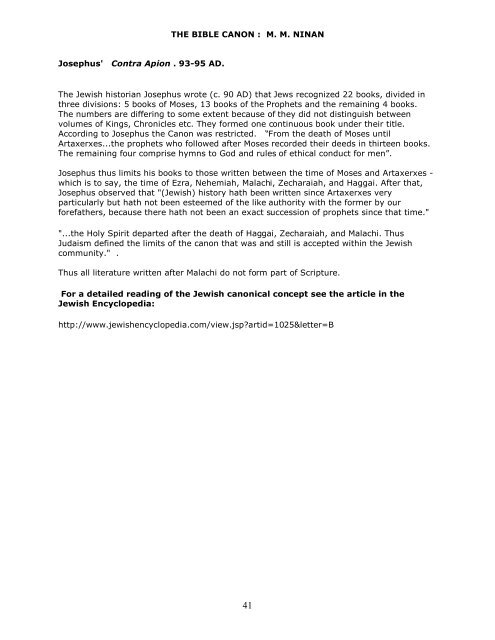You also want an ePaper? Increase the reach of your titles
YUMPU automatically turns print PDFs into web optimized ePapers that Google loves.
THE BIBLE CANON : M. M. NINAN<br />
Josephus' Contra Apion . 93-95 AD.<br />
The Jewish historian Josephus wrote (c. 90 AD) that Jews recognized 22 books, divided in<br />
three divisions: 5 books of Moses, 13 books of the Prophets and the remaining 4 books.<br />
The numbers are differing to some extent because of they did not distinguish between<br />
volumes of Kings, Chronicles etc. They formed one continuous book under their title.<br />
According to Josephus the <strong>Canon</strong> was restricted. “From the death of Moses until<br />
Artaxerxes...the prophets who followed after Moses recorded their deeds in thirteen books.<br />
The remaining four comprise hymns to God and rules of ethical conduct for men”.<br />
Josephus thus limits his books to those written between the time of Moses and Artaxerxes -<br />
which is to say, the time of Ezra, Nehemiah, Malachi, Zecharaiah, and Haggai. After that,<br />
Josephus observed that "(Jewish) history hath been written since Artaxerxes very<br />
particularly but hath not been esteemed of the like authority with the former by our<br />
forefathers, because there hath not been an exact succession of prophets since that time."<br />
"...the Holy Spirit departed after the death of Haggai, Zecharaiah, and Malachi. Thus<br />
Judaism defined the limits of the canon that was and still is accepted within the Jewish<br />
community." .<br />
Thus all literature written after Malachi do not form part of Scripture.<br />
For a detailed reading of the Jewish canonical concept see the article in the<br />
Jewish Encyclopedia:<br />
http://www.jewishencyclopedia.com/view.jsp?artid=1025&letter=B<br />
41


















